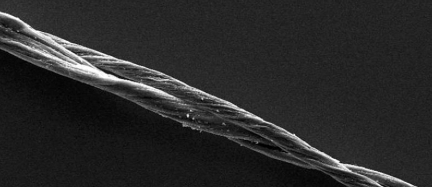Rice University research team has developed a cable using double-walled carbon nanotubes. They have also demonstrated the cable’s conductivity by powering a fluorescent light bulb at normal line voltage.
 A power cable made entirely of iodine-doped double-walled carbon nanotubes
A power cable made entirely of iodine-doped double-walled carbon nanotubes
The research team utilized pristine nanotubes for the fabrication of the cables that can be linked together while still retaining their conductivity. The nanocables were doped with iodine in order to enhance their conductivity and retain their stability. The specific conductivity of the nanocables surpasses that of metals such as silver and copper and is lesser than sodium, which has the highest specific conductivity.
Yao Zhao of Rice University performed the demonstration in which he substituted traditional copper wire utilized in the light-bulb circuit with the nanocable. During the demonstration, he observed that the nanocable was not damaged even after the bulb burned for several days and demonstrated superior strength and toughness. He also detected that the nanocable worked efficiently for a broad range of temperatures and retained its conductivity when tied together with another cable.
Nanocables light way to the future
Enrique Barrera, who serves as professor of mechanical engineering and materials science at Rice University, stated that fabricating billions of nanotubes into a cable is a big challenge. The chemical processes employed to develop and then arrange nanotubes will eventually be part of a larger process that starts with raw materials and results in a uniform stream of nanocables, he added. The next step is to fabricate thicker and lengthier cables that conduct higher current, while ensuring that the wire remains lightweight, he said.